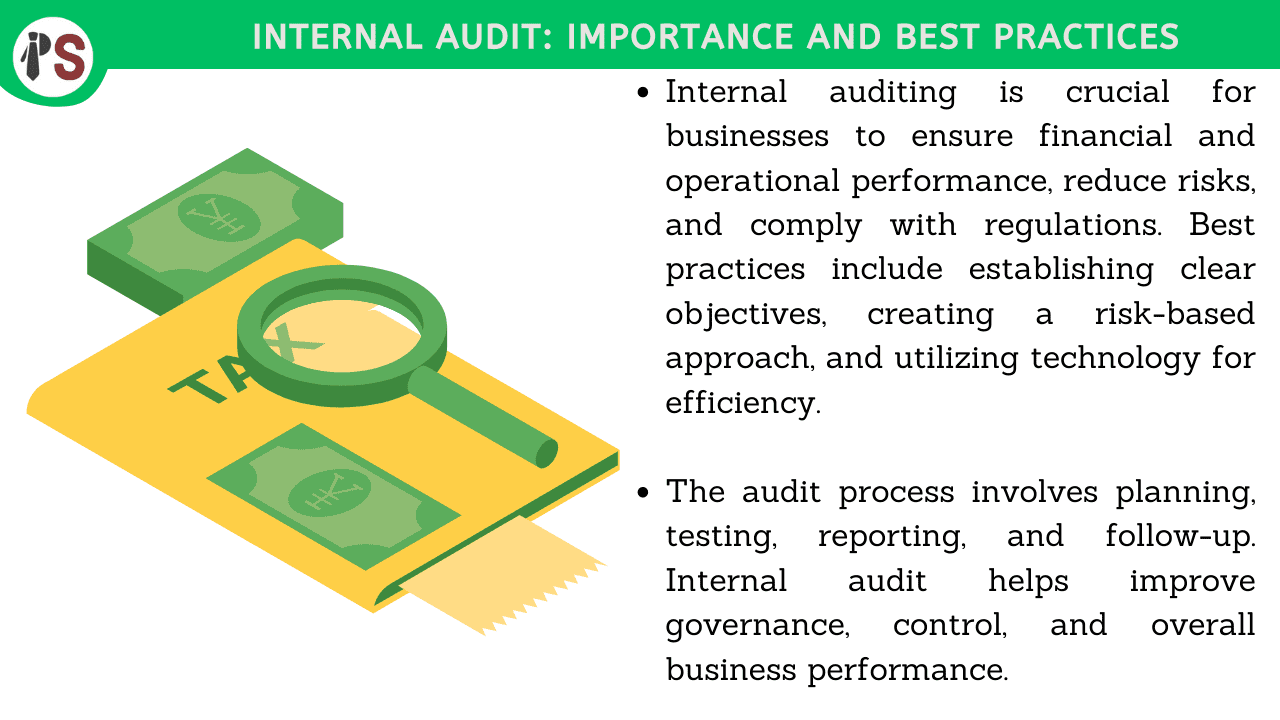
Internal audit is an essential part of any organization's governance process. It is a systematic, independent, and objective evaluation of an organization's risk management, control, and governance processes. The purpose of an internal audit is to help an organization achieve its objectives by bringing a systematic approach to evaluate and improve the effectiveness of risk management, control, and governance processes.
Helps in risk management: Internal audit helps in identifying, evaluating, and managing the risks associated with an organization's operations, processes, and systems. By identifying risks, an organization can take proactive measures to mitigate them and minimize potential losses.
Ensures compliance: Internal audit ensures that an organization is complying with relevant laws, regulations, policies, and procedures. Compliance with these regulations can help avoid legal penalties, fines, or reputational damage.
Improves operational efficiency: Internal audit identifies inefficiencies in an organization's operations, processes, and systems. By identifying and eliminating these inefficiencies, an organization can improve its efficiency and reduce costs.
Enhances corporate governance: Internal audit helps in improving the overall corporate governance of an organization. By evaluating and improving the effectiveness of an organization's risk management, control, and governance processes, internal audit helps in building trust among stakeholders and enhancing the reputation of the organization.
Develop an audit plan: The internal audit team should develop a risk-based audit plan that aligns with the organization's objectives. The audit plan should cover all significant areas of the organization, including its operations, financial reporting, and compliance with laws and regulations.
Maintain independence: Internal auditors should be independent of the operations they are auditing. They should report directly to the board of directors or the audit committee to ensure their independence.
Use a systematic approach: Internal audit should follow a systematic approach that includes planning, fieldwork, reporting, and follow-up. This approach ensures that the audit is conducted consistently and thoroughly.
Communicate findings: Internal audit should communicate its findings to the relevant stakeholders, including the board of directors and management. The communication should be clear, concise, and timely to enable prompt action to address any issues identified.
Continuous improvement: Internal audit should continuously evaluate and improve its processes to enhance its effectiveness. This includes monitoring and analyzing the results of the audits to identify areas for improvement and implementing corrective action.
Internal audit is a critical function that helps an organization achieve its objectives by evaluating and improving the effectiveness of its risk management, control, and governance processes. By following best practices for internal audit, organizations can ensure that they are complying with relevant laws and regulations, improving operational efficiency, enhancing corporate governance, and mitigating risks. A well-executed internal audit can provide valuable insights into an organization's operations, identify areas for improvement, and help drive positive change.
At Professional Saathi, we offer a range of business consultancy services that help businesses improve their performance, achieve growth, and overcome challenges.
Copyright 2026 © Created By KTPG PROFESSIONAL SAATHI CORPORATE CONSULTANT PRIVATE LIMITED, All Rights Reserved.
Leave Your Comment